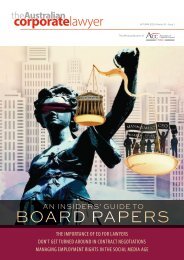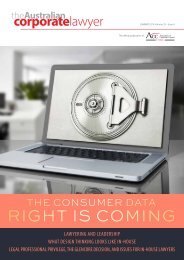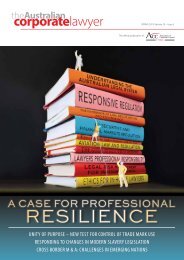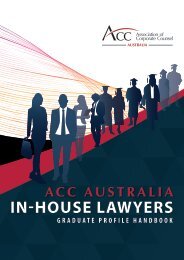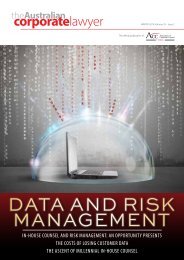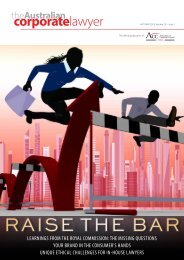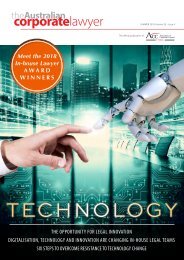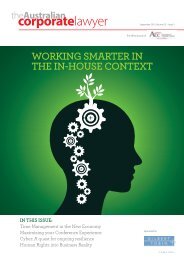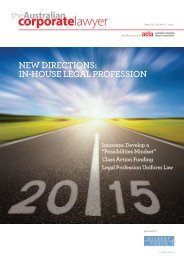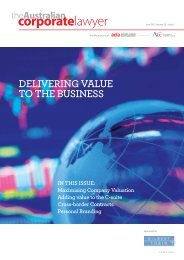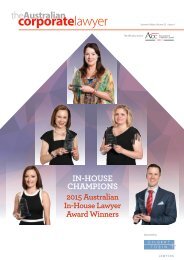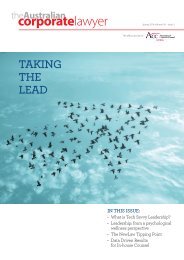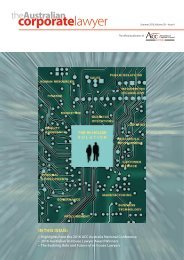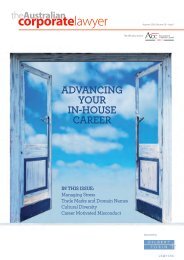Australian Corporate Lawyer - Autumn 2017
Australian Corporate Lawyer is the official publication of the Association of Corporate Counsel (ACC) Australia. The Autumn 2018 issue focuses on 'The Law and Technology' and features a range of articles covering topics including: the future of contracts and; the future of law firms as software companies..
Australian Corporate Lawyer is the official publication of the Association of Corporate Counsel (ACC) Australia. The Autumn 2018 issue focuses on 'The Law and Technology' and features a range of articles covering topics including: the future of contracts and; the future of law firms as software companies..
Create successful ePaper yourself
Turn your PDF publications into a flip-book with our unique Google optimized e-Paper software.
acla.acc.com<br />
THE LAW AND TECHNOLOGY<br />
– PANEL INTERVIEW<br />
Chaman Sidhu<br />
David Bushby<br />
Vered Keisar<br />
Luke O’Sullivan<br />
Boasting extensive experience in<br />
Australia and the U.S, Chaman offers<br />
a deep understanding of global and<br />
cross-border legal matters including<br />
general commercial transactions,<br />
M&A, governance and intellectual<br />
property. Chaman currently serves as<br />
the General Counsel and Company<br />
Secretary of Xero and brings a passion<br />
for people, culture, and innovation to<br />
the organisation.<br />
Chaman was a panelist at ACC<br />
New South Wales and Victorian<br />
<strong>Corporate</strong> Counsel Days <strong>2017</strong>.<br />
With a background encompassing<br />
both professional practice and a variety<br />
of in-house roles, David currently<br />
serves as Managing Director for Lexoo<br />
Australia, an online legal marketplace<br />
matching commercial lawyers with<br />
businesses and in-house teams. He’s<br />
also the founder and curator for Law<br />
Hackers, a weekly newsletter curating<br />
the best of legal technology and<br />
startup trends in the legal sector.<br />
As the Associate General Counsel – Asia<br />
Pacific at ResMed, Vered is responsible<br />
for the provision of legal services<br />
across Asia Pacific and the Middle<br />
East, while holding global legal<br />
responsibilities for healthcare<br />
informatics and data privacy.<br />
Vered is admitted to practice law in<br />
Australia, England and Israel and is an<br />
ambassador and a regular speaker for<br />
the National Breast Cancer Foundation.<br />
Vered is a member of<br />
ACC Australia’s NSW<br />
Divisional committee.<br />
Vered was a panelist at ACC<br />
Australia’s Victorian <strong>Corporate</strong><br />
Council Day <strong>2017</strong>.<br />
With over a decade of experience<br />
across technology development,<br />
encompassing vendor, purchaser and<br />
private practice advisor, Luke has a<br />
deep understanding of the convergence<br />
of technology and the law. Luke<br />
currently serves as Regional General<br />
Counsel at Symantec, leading the legal<br />
team for Symantec and its subsidiaries<br />
in the Pacific region, as well as leading<br />
the Privacy function across Asia-Pacific.<br />
Luke was a panelist at ACC<br />
Australia’s Victorian <strong>Corporate</strong><br />
Counsel Day <strong>2017</strong>.<br />
1. How has technology changed<br />
or influenced the way in-house<br />
counsel operate?<br />
Chaman Sidhu: In the same way as<br />
technology has fundamentally influenced<br />
us in our broader society. The way I<br />
communicate, collaborate and produce is very<br />
different from 10 years ago due to technology.<br />
For me personally, adopting agile and lean<br />
ways of working, which I learned from<br />
colleagues in software development teams,<br />
has been a huge influence on having a more<br />
flexible, innovative mindset in my legal roles.<br />
It’s also exciting that technology has allowed<br />
more personally flexible ways of working<br />
that focus on results, which supports greater<br />
happiness and diversity at work.<br />
David Bushby: Technology has changed or<br />
influenced the way in-house counsel operate<br />
in two ways: first there’s the technology itself,<br />
which not only helps in-house counsel do<br />
more with less (e.g. when a business unit can<br />
self-serve with automated documents or an<br />
expert legal systems) but also helps legal<br />
departments improve their operations by, for<br />
example, identifying legal bottlenecks or cost<br />
blowouts through analytics. The second way<br />
is around project management methods, such<br />
as Agile and Kanban workflows, which have<br />
their roots in software development, but are<br />
now being practised in corporate legal teams,<br />
such as Lonely Planet.<br />
Vered Keisar: As our organisation moves<br />
faster, we as in-house are also expected to<br />
accelerate our service delivery. For most inhouse<br />
lawyers the most valuable commodity<br />
is time. Therefore any technology that can<br />
save us time, increase productivity and assist<br />
in generating metrics that demonstrate<br />
our value to our organisation is welcome.<br />
Technology is influencing the volume and<br />
complexity of matters that we can handle inhouse<br />
because we can use systems that help<br />
us expedite the creation of legal documents<br />
and advice. Legal research generally no longer<br />
involves going to the library or even opening<br />
a book. With templates and smart documents<br />
we only need to draft a clause once. Overall,<br />
technology has substantially improved the<br />
quality of our work and enabled more time<br />
to focus on more complex matters that add<br />
higher value to our organisation.<br />
Luke O’Sullivan: The way in which the role of<br />
in-house counsel is performed, or ought to be<br />
performed, has changed fundamentally. Over<br />
the past decade and a half we have moved<br />
from limited availability of concentrated<br />
data sets to the proliferation of data. This<br />
has led to many great opportunities for<br />
counsel (for example: data insights; real time<br />
departmental analytics; and data-based legal<br />
decision making). It has also led to increased<br />
efforts in managing risk and a greater need to<br />
maintain currency of knowledge, about not<br />
only the law and its development, but also<br />
technological development. It is up to counsel<br />
to be aware of which tools are available to<br />
support their needs, and to then leverage<br />
effectively those tools to ensure the best<br />
outcomes for their organisation.<br />
2. Amongst all the noise of startups/disrupters<br />
in the legal sector,<br />
how do you figure out what<br />
technology is relevant to your<br />
needs? What legal technology<br />
have you invested in?<br />
C.S. There are so many options these days<br />
that it can be confronting. I think the best<br />
VOLUME 27, ISSUE 1 – AUTUMN <strong>2017</strong><br />
7



